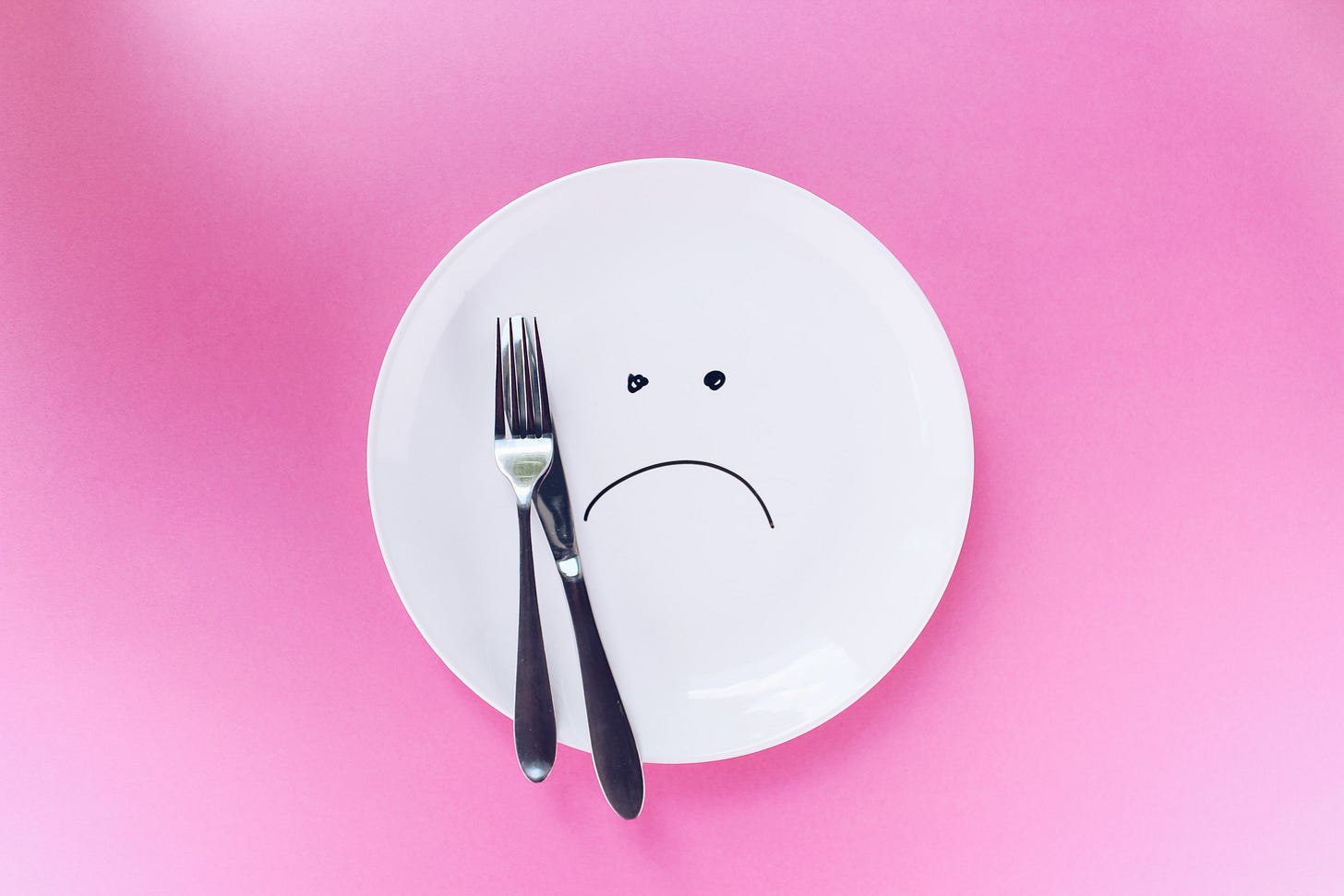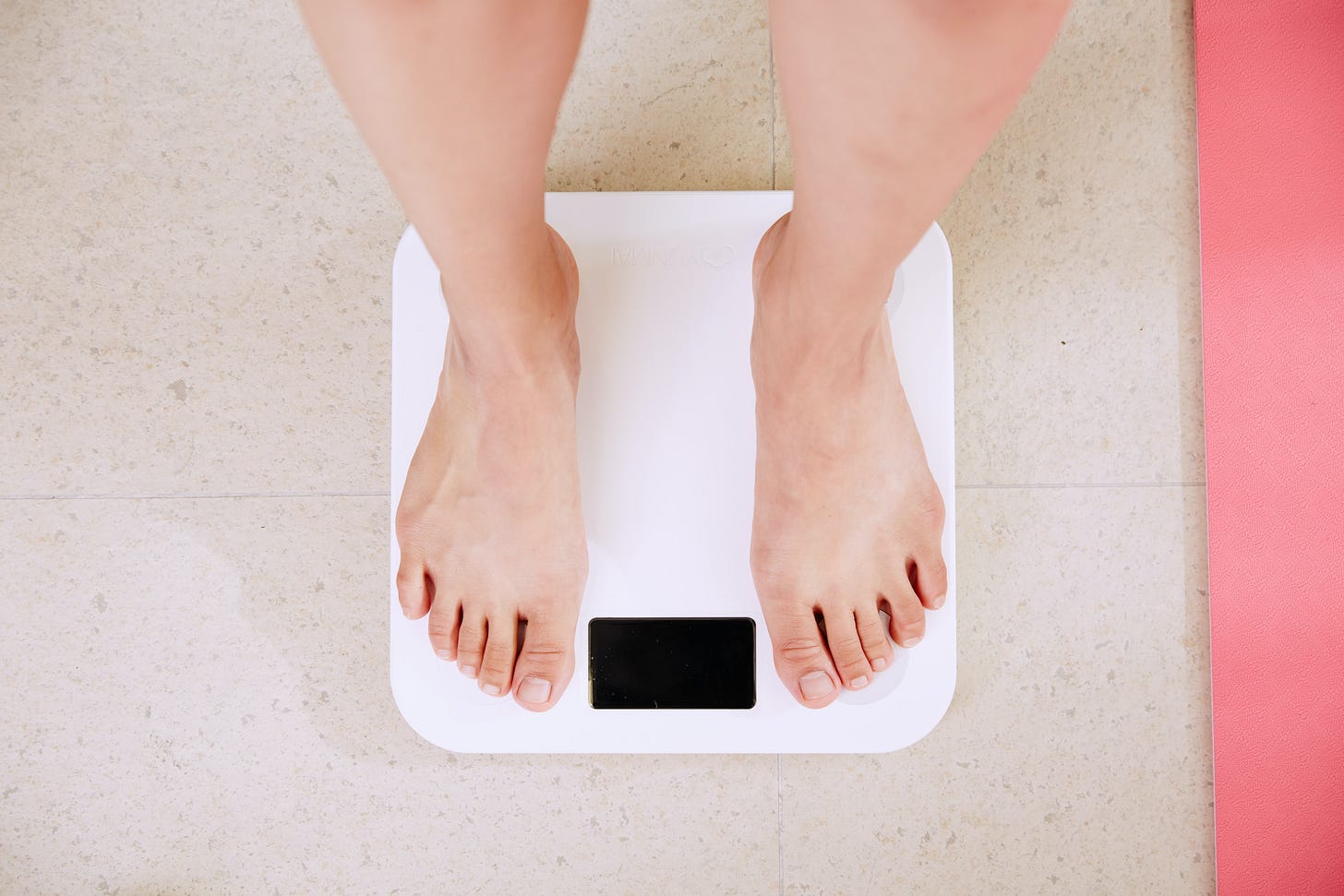Welcome to the second installment of ~Clearing Things Up~, where I’m taking some commonly-held (but not-so-true) beliefs about food, fitness & healthy living and clearing. things. up.
Last week— we talked about why you should be prioritizing strength training in addition to cardio if your goal is to lose body fat + look “toned.”
This week, we *need* to talk about why eating low-calorie & dieting forever doesn’t work.
*emphasis on the “need” because this is truly an urgent matter… way too many of us are out here just infinitely eating as little as possible.

You might be thinking, “Wait a minute— I thought that’s how weight loss worked…
calories in < calories out
… right?”
Most of us have heard of this simple “weight loss” equation:
burn more than you take in, and you’ll lose weight.
Boom.
And so, desperate to lose weight, we basically just try to consume as few calories as possible, and if—heaven forbid— we “over-consume” (or even just feel like we’ve over-consumed) we bang out a ton of cardio in efforts to “burn off” the calories we consumed, thus keeping us in good standing with the weight loss equation, amirite?
Thought so.
I’ve been there. I used to think this way, too.

There are several problems with this strategy of “eat a little, move a lot.”
metabolic adaptation
metabolic down-regulation
malnourishment
psychological harm
disordered eating tendencies
unhealthy relationship with exercise/movement
… to name a few.
Let’s break it down.
Metabolic Adaptation
*Don’t get intimidated by fancy words. You’re a grown @ss woman fully capable of understanding this concept.
Metabolic = referring to your metabolism, or, your body’s ability to use food (aka calories) as energy.
Adaptation = a response to change/input in an effort to continue to survive
Your body’s [ability to convert food to energy]
responds to
[the changes/inputs you give it.]Your metabolism will adapt in order to keep you surviving and functioning how you’re meant to.
This means if you consistently eat—let’s say— 1,000 calories/day, your body is going to get used to operating off of 1,000 calories.
And once your body is used to any number of calories, it stops responding. Weight loss = a change, and in order to produce a change, we need a new stimulus, like different caloric intake/output.
Essentially- you can’t do the same thing forever (in either direction) because in order for change to occur, it must be prompted by something new.

Metabolic Down-Regulation
Much like metabolic adaptation, metabolic down-regulation refers to your body’s ability to use food as fuel down regulating, or decreasing.
Right now, your metabolic rate (calories required to function each day) might be something like 1400 calories/day.
This means without doing a d@mn thing, your body burns 1400 calories by itself.
I don’t know about you, but I think it’d be pretty much amazing if my body would just burn like, 2,000 calories/day without me lifting a finger, right??
This would be metabolic up-regulation, which should be our ultimate goal.
Metabolic down-regulation occurs when our bodies actually lower our metabolism in order to learn how to survive on less calories.
This is what happens when we consistently eat less than we’re supposed to:
our bodies actually learn how to function on less calories rather than learn how to use more calories efficiently.Which would you prefer: to burn 1200 calories or 2000 calories naturally?
When you diet forever, you are forever adding coins to the metabolic down-regulation bank.
Malnourishment
This one’s fairly obvious.
When we consistently eat too-little, if we’re not careful, we can deprive our bodies of vital nutrients— both on a macro and micro level.
This means, if we’re not paying close attention and monitoring our intake accurately (which— let’s be honest, most of us aren’t actually tracking, we’re just always trying not to eat “a lot”) we could be missing out on adequate protein for our muscles & skin, fats for our hormones, vitamins + minerals for our body’s natural functions.
Psychological Harm

If you’ve been dieting on/off most of your life like most women, you know exactly what we’re talking about with this one.
Constantly focusing on how much you’re consuming and burning, seeking out the lowest-calories options, panicking at potentially “over-eating” or missing opportunities to burn calories takes a massive toll on your psychological health.
Not only does extensive dieting cause you to miss out on memorable experiences, it just messes with your mind big time.
Disordered Eating Tendencies
Although you might not ever suffer from a “true” eating disorder, disordered eating is something that will likely touch every woman at some point in her life.
Labeling foods as “good,” “bad,” “clean,” or “off-limits,” fearing foods, not feeling comfortable eating without knowing all of the ingredients/portions/calories, obsessively weighing, tracking and counting, developing “sneaky” strategies to get around eating foods you think will make you gain weight…
these are all disordered eating tendencies.
And when we hyper-focus on “eat less, eat less, eat less,” this is what can happen.
An Unhealthy Relationship With Exercise/Movement
When we view exercise and movement as strictly a means of burning calories and “undoing” food, we eliminate all possibility of just moving for fun.
It’s hard to choose movement from a place of pleasure or enjoyment when we have tied it so closely to a “punishment” for “bad” foods.

It’s difficult to see a bike ride or long hike as a chance to bond with family members or take in nature, when we’re counting how many calories we’ve burned or steps we’ve taken.
If our main focus is how many calories we’re taking in and burning, exercise and movement become tools more than expressions of presence, gratitude, fun and healthy challenge.
Look, I know it seems logical based on many things we read and see and are being sold on a daily basis, but we can’t just eat low-calorie and diet forever.
It doesn’t work.
I promise.
It might work at first, and if you have weight to lose for healthy reasons, I hope it does.
But eventually, more of the same thing won’t cut it.
My advice is to play the long game and see the bigger picture.
And the way to do that is to go through periods of dieting, and then periods of maintenance and even gaining.
The most effective way to lose weight and get the body you want is to do it cyclically, not all at once.
Want to know what that looks like in your life?
Shoot me a message and I’ll do my best to help you out.
:)

